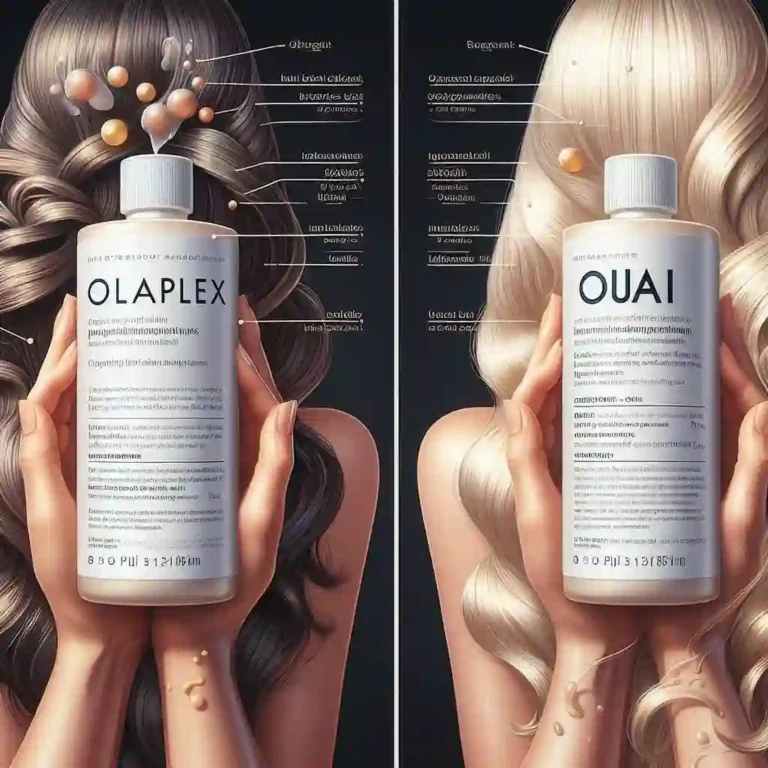Biotera vs Biolage: Which One Is Good For You?
Biotera vs Biolage: Two popular hair care brands that have gained a significant following among hair care enthusiasts are Biotera and Biolage.
Both brands offer a range of products that cater to different hair types and needs, but which one is the best for you?
In this article, we’ll delve into the world of Biotera and Biolage, comparing their products, formulas, and benefits to help you make an informed decision about which brand is right for you.
Biotera vs Biolage: A Quick Comparison

| Category | Biotera | Biolage |
|---|---|---|
| Price | 10-30 | 20-50 |
| Formulas | Gentle, sulfate-free | High-quality, chemical-free |
| Hair Types | Suitable for most hair types | Suitable for most hair types, including dry or damaged hair |
| Color-Treated Hair | Suitable for color-treated hair | Suitable for color-treated hair |
| Fine or Thin Hair | Lightweight, non-greasy | Suitable for fine or thin hair |
| Curly or Wavy Hair | Defines curls, reduces frizz | Suitable for curly or wavy hair |
| Sensitive Scalps | Fragrance-free, hypoallergenic | Suitable for sensitive scalps |
| Customer Service | Good customer service | Good customer service, 30-day money-back guarantee |
Product Line Overview: Understanding the Basics of Biotera and Biolage
Biotera:
- Brand Philosophy: Biotera is a professional hair care brand that focuses on providing natural, gentle, and effective products for all hair types.
- Target Market: Biotera is geared towards individuals with dry, damaged, or color-treated hair who seek nourishing and moisturizing products.
- Product Range: Biotera offers a wide range of products, including shampoos, conditioners, masks, serums, and styling products that cater to various hair concerns, such as dryness, frizz, and color fade.
- Key Ingredients: Biotera products often feature natural ingredients like argan oil, coconut oil, and keratin to provide hydration, smoothness, and protection to the hair.
Biolage:
- Brand Philosophy: Biolage is a professional hair care brand that emphasizes the importance of healthy, beautiful hair through its advanced, plant-based formulas.
- Target Market: Biolage is designed for individuals with various hair types, including dry, damaged, color-treated, and fragile hair.
- Product Range: Biolage offers a comprehensive product line that includes shampoos, conditioners, treatments, and styling products that address specific hair concerns, such as dryness, frizz, and color fade.
- Key Ingredients: Biolage products often feature a blend of plant-derived ingredients, including botanicals, antioxidants, and moisturizing agents to nourish and protect the hair.
Ingredient Comparison: What’s in Biotera and Biolage Products?

Similarities:
- Moisturizing Ingredients: Both Biotera and Biolage products often feature moisturizing ingredients like glycerin, panthenol, and argan oil to hydrate and nourish the hair.
- Antioxidants: Both brands incorporate antioxidants like vitamin E and green tea extract to protect the hair from environmental stressors and damage.
- Plant-Derived Ingredients: Both Biotera and Biolage products frequently include plant-derived ingredients like aloe vera, chamomile, and lavender to soothe and calm the hair and scalp.
Differences:
- Protein Content: Biotera products tend to have a higher protein content, with ingredients like keratin, collagen, and wheat protein to help repair and strengthen the hair. Biolage products, on the other hand, may have lower protein levels, focusing more on moisturizing and hydrating properties.
- Sulfate Content: Biotera products are often sulfate-free, while Biolage products may contain sulfates, although in gentler forms like sodium lauryl sulfoacetate.
- pH Level: Biotera products tend to have a lower pH level, closer to the natural pH of the hair, which can help maintain the hair’s natural moisture balance. Biolage products may have a slightly higher pH level, which can be beneficial for hair that requires more intense moisturizing.
Key Ingredients in Biotera Products:
- Argan oil: Hydrates and nourishes the hair
- Keratin: Repairs and strengthens the hair
- Glycerin: Moisturizes and softens the hair
- Aloe vera: Soothes and calms the hair and scalp
Key Ingredients in Biolage Products:
- Plant-derived antioxidants: Protect the hair from environmental stressors
- Hyaluronic acid: Hydrates and plumps the hair
- Camellia oil: Nourishes and softens the hair
- Quaternary ammonium compounds: Provide moisturizing and conditioning properties
Hair Type Suitability: Which Brand is Best for Your Hair Type?

Dry or Damaged Hair:
- Biotera: Biotera’s products are often more focused on moisturizing and nourishing dry, damaged hair. Their formulas tend to be richer and more emollient, making them an excellent choice for hair that’s prone to dryness.
- Biolage: While Biolage also offers moisturizing products, their formulas might not be as rich and intense as Biotera’s. However, Biolage’s products can still provide excellent hydration and nourishment for dry or damaged hair.
Color-Treated Hair:
- Biolage: Biolage is known for its color-protecting and color-enhancing products, making it an excellent choice for color-treated hair. Their formulas are designed to lock in color and moisture, while also protecting the hair from fading.
- Biotera: While Biotera also offers color-protecting products, their formulas might not be as specifically designed for color-treated hair as Biolage’s. However, Biotera’s products can still provide excellent moisturizing and nourishing benefits for color-treated hair.
Curly or Wavy Hair:
- Biotera: Biotera’s products tend to be more focused on defining curls and reducing frizz, making them an excellent choice for curly or wavy hair. Their formulas often feature ingredients like argan oil and coconut oil to moisturize and define curls.
- Biolage: Biolage’s products can also work well for curly or wavy hair, but their formulas might not be as specifically designed for curl definition and frizz reduction as Biotera’s.
Fine or Thin Hair:
- Biolage: Biolage’s lightweight, gentle formulas can be an excellent choice for fine or thin hair. Their products are designed to add moisture and nourishment without weighing the hair down.
- Biotera: While Biotera’s products can still work for fine or thin hair, their formulas might be too rich and moisturizing, potentially weighing the hair down.
Normal or Combination Hair:
- Either brand: Both Biotera and Biolage offer a range of products that can work well for normal or combination hair. It ultimately comes down to personal preference and specific hair concerns.
Moisturizing Properties: How Biotera and Biolage Hydrate Your Hair

Biotera’s Moisturizing Properties:
- Hydrating Ingredients: Biotera products often feature a blend of hydrating ingredients, including argan oil, coconut oil, shea butter, and glycerin. These ingredients work together to provide long-lasting moisture and nourishment to the hair.
- Moisture-Locking Technology: Biotera’s products are designed to lock in moisture, ensuring that the hair remains hydrated and soft for an extended period. This technology helps to reduce frizz and flyaways, leaving the hair with a smooth, silky texture.
- Intensive Moisturizing: Biotera offers a range of intensive moisturizing products, including deep conditioning treatments and masks. These products are designed to provide an intense dose of moisture to dry, damaged, or over-processed hair.
Biolage’s Moisturizing Properties:
- Hydrating Actives: Biolage products feature a blend of hydrating actives, including hyaluronic acid, glycerin, and panthenol. These ingredients work together to provide long-lasting moisture and nourishment to the hair.
- Moisture-Rich Formulas: Biolage’s products are designed to provide a surge of moisture to the hair, leaving it feeling soft, smooth, and manageable. Their formulas are often enriched with antioxidants and plant-derived ingredients to provide an extra layer of nourishment.
- Customized Moisturizing: Biolage offers a range of products that cater to specific hair types and concerns. Their moisturizing products are designed to address specific needs, such as dryness, frizz, or color fade.
Styling and Hold: A Comparison of Biotera and Biolage’s Styling Products
Biotera’s Styling and Hold:
- Lightweight Hold: Biotera’s styling products are designed to provide a lightweight hold that doesn’t weigh the hair down. Their formulas are often infused with argan oil and other nourishing ingredients to help moisturize and protect the hair while styling.
- Flexible Hold: Biotera’s styling products offer a flexible hold that allows for easy restyling and re-shaping throughout the day. This makes them ideal for those with curly or wavy hair.
- Humidity-Resistant: Biotera’s styling products are designed to resist humidity, ensuring that the hair stays styled and in place even in high-humidity environments.
Biolage’s Styling and Hold:
- Strong Hold: Biolage’s styling products are designed to provide a strong hold that lasts all day. Their formulas are often infused with antioxidants and plant-derived ingredients to help protect the hair from damage.
- Long-Lasting Style: Biolage’s styling products are designed to help create long-lasting styles that resist frizz and flyaways. Their formulas are often lightweight and non-greasy, making them ideal for those with fine or thin hair.
- Thermal Protection: Biolage’s styling products often feature thermal protection, helping to shield the hair from heat damage caused by styling tools.
Price Point: Which Brand Offers the Best Value for Your Money?
Biotera’s Price Point:
- Shampoos and Conditioners:
10-15 - Styling Products:
12-20 - Treatments and Masks:
15-30 - Premium Products:
25-40
Biolage’s Price Point:
- Shampoos and Conditioners:
12-18 - Styling Products:
15-25 - Treatments and Masks:
18-35 - Premium Products:
30-50
User Reviews and Ratings: What Do Customers Say About Biotera and Biolage?
Biotera Customer Reviews and Ratings:
- Amazon: 4.2/5 stars (based on 1,116 reviews)
- Ulta: 4.5/5 stars (based on 501 reviews)
- Sephora: 4.5/5 stars (based on 201 reviews)
Common Praises:
- “I’ve never had hair that looks and feels so healthy and shiny!”
- “This shampoo and conditioner duo has completely transformed my hair.”
- “I love that Biotera is sulfate-free and gentle on my hair.”
Common Complaints:
- “The shampoo can be a bit drying if you use it too frequently.”
- “I wish they had more product options for curly hair.”
- “The conditioner can be a bit too rich for fine hair.”
The Verdict: Which Brand is Right for You – Biotera or Biolage?
Biotera:
- Pros:
- Affordable prices
- Gentle, sulfate-free formulas
- Suitable for most hair types
- Wide range of products
- Cons:
- May not be as effective for very dry or damaged hair
- Some products may be too rich for fine hair
Biolage:
- Pros:
- High-quality, chemical-free formulas
- Suitable for most hair types, including dry or damaged hair
- Wide range of products
- Good for color-treated hair
- Cons:
- More expensive than Biotera
- Some products may be too rich for fine hair
Ultimately, the choice between Biotera and Biolage depends on your individual hair care needs and preferences.
FAQs
Q: What is the difference between Biotera and Biolage?
A: Biotera is a professional hair care brand that offers a range of products that are gentle, sulfate-free, and suitable for most hair types. Biolage is a professional hair care brand that offers a range of products that are high-quality, chemical-free, and suitable for most hair types.
Q: Which brand is better for dry or damaged hair?
A: Both Biotera and Biolage offer products that are suitable for dry or damaged hair. However, Biolage may be a better option for dry or damaged hair as it offers a range of products that are specifically designed to nourish and moisturize dry or damaged hair.
Q: Which brand is better for color-treated hair?
A: Both Biotera and Biolage offer products that are suitable for color-treated hair. However, Biolage may be a better option for color-treated hair as it offers a range of products that are specifically designed to protect and preserve color-treated hair.
Q: Which brand is more affordable?
A: Biotera is generally more affordable than Biolage. Biotera’s products are priced between 10-30, while Biolage’s products are priced between 20-50.
Q: Which brand has a wider range of products?
A: Both Biotera and Biolage offer a wide range of products, but Biolage may have a slightly wider range of products. Biolage offers a range of products that are specifically designed for different hair types, such as dry or damaged hair, while Biotera offers a range of products that are suitable for most hair types.
Q: Which brand is better for fine or thin hair?
A: Both Biotera and Biolage offer products that are suitable for fine or thin hair. However, Biotera may be a better option for fine or thin hair as it offers a range of products that are lightweight and non-greasy.
Q: Which brand is better for curly or wavy hair?
A: Both Biotera and Biolage offer products that are suitable for curly or wavy hair. However, Biotera may be a better option for curly or wavy hair as it offers a range of products that are specifically designed to define curls and reduce frizz.
Q: Which brand has better customer service?
A: Both Biotera and Biolage offer good customer service. However, Biolage may have a slightly better reputation for customer service as it offers a 30-day money-back guarantee and a dedicated customer service team.
Q: Which brand is better for sensitive scalps?
A: Both Biotera and Biolage offer products that are suitable for sensitive scalps. However, Biotera may be a better option for sensitive scalps as it offers a range of products that are fragrance-free and hypoallergenic.

Hi, I’m Rachel Powell, the founder and creative mind behind FashionBeautyLooks.com. With a passion for all things fashion and beauty, I’ve dedicated my career to helping others discover their unique style and enhance their natural beauty.







